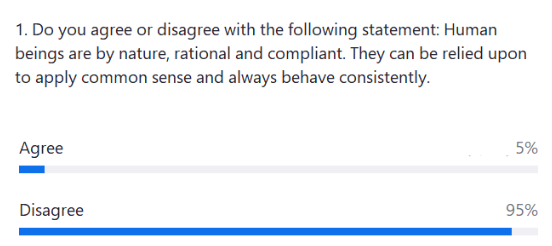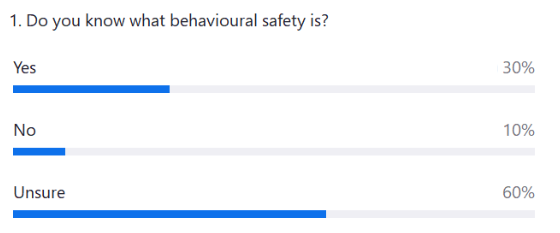_1000.png)
This blog is based on Judicium’s Health and Safety ‘Sofa Session’ from the 4th of July, with our resident expert Rachel Kitchen, BSc (Hons) CMIOSH. This session focused on how we behave at work, human contribution to incidents, and human behaviour/ failures in previous incidents.
Poll 1

Are we always rational and compliant? Do we apply common sense, and do we behave consistently?
Background
The workforce within the Education sector accounts for 11% of the total workforce in Great Britain.
Current statistics for accidents in education show that in an average 12-month period, there will be 51,000 non-fatal injuries to staff. Many of these can be easily prevented with effective training, analysis and modifying human behaviours.
Health and Safety Executive latest figures in Education: March 2023.
- Zero fatal injuries to workers in 2022/23.
- However, there were 2 fatal injuries to members of the public in 2022/23.
- 174,000 workers reported work-related ill health
- Including stress, depression and anxiety.
- 19% of health issues were related to musculoskeletal disorders
- Which equates to approximately 33,000 workers in education.
- An average of 36,000 workers sustained non-fatal injuries over two periods 2020/21-2022/23.
- The total cost of health issues and injuries is estimated at £1.9 billion
- On average, 3 million working days are lost annually due to injury and ill health
Why did 36,000 workers sustained non-fatal injuries during the time specified?
Of course, we are not able to investigate/analyse all 36,000 incidents. However, from collective experience as consultants we have seen several examples of incidents where employees have not been Rational, Compliant or Consistent and thus result in accidents and/or injuries.
Poll 2
What is Behavioural Safety?
Behavioural safety is an approach aimed at improving Health and Safety Standards within an organisation or in our case a school or academy by altering the behaviour of our staff. Rather than focusing solely on physical hazards, it emphasises the role of individual actions and choices in preventing accidents and injuries whilst at work.
It is estimated that in up to 80% of work-related accidents, staff behaviour in the form of dangerous acts or omissions is a contributing factor.
Why do people behave unsafely at work:
- Cutting corners to save time/ pressures of the role
- Accepted practice – ‘We have always done it that way’
- Poor example of role models
- Risk perception
Accidents - The Human Contribution
The way we behave can cause or contribute to an accident in several ways. Through a ‘failure’ of which there are two types Errors and Violations, a person can directly cause an accident. People can make irrational, catastrophic decisions even when they are aware of the risks.
- Errors – An action or a decision which was not intended and led to an unwanted outcome. This could be caused by a lack of experience, inadequate inductions and training etc.
- Violations – A deliberate deviation from a rule or procedure.
However, it is important to note that not all human behaviour is negative, people can also intervene to stop potential accidents and the outcomes of an incident can be reduced by the emergency response of staff.
Why do people behave unsafely?
Cutting Corners
Are staff cutting corners to save time? What pressure are they under? Possibly you should review the pressures of the role.
Risk Perception
Do we assume the accident will never happen? We can work to change people’s risk perceptions through training and understanding. It’s important to have conversations to see why staff perceive the risk in that way and ensure they know that although it might be unlikely to happen, it is always best to be cautious as the results could be catastrophic.
Accepted Practice
“We have always done it that way!” – This does not mean it is the correct way or it is a safe way. Just because an accident or incident has not occurred previously, does not mean that it will not in the future.
Role Models
There may be poor examples of role models within your school or trust setting where bad habits are picked up. Do we have good role models leading from a management/ supervisory level?
The Behavioural Safety Approach
As noted, a significant number of workplace accidents and those within education are reportedly caused through unsafe behaviour. Schools and trusts should have detailed policies, risk assessments and procedures in place to manage health and safety. In addition to this, a behavioural safety approach also allows good management and workforce participation. This helps to lead staff engagement with safety and safety discussions within the workplace.
A behavioural safety approach can empower staff to act promptly if they see unsafe acts and allow them to have a voice about safety. A good behavioural safety culture should not create a blame culture, but rather allow staff to reflect, learn and re-educate. Feedback and discussion should also be encouraged.
Behavioural Safety on Trips
Excitement can play a role when on educational visits as well as unfamiliarity of the location. It is important to be prepared, keep in mind rationality, and be consistent e.g. if there is a behaviour you follow in school, try to promote that behaviour outside of school too.
It might be a good idea to have a briefing before a trip with staff and with students to discuss expectations of behaviour in relation to their safety and the safety of those around them. Ensure staff have read and understood the risk assessment and can challenge it if they think it isn’t realistic.
Behavioural and safety issues will obviously change based on the activity, but if you feel the provider is doing something unsafe, don’t feel afraid to bring this up with them.
Behavioural Safety Structure - Where do we start?
Secure buy-in
This should come from all levels, Headteacher/ Senior Leadership Team/ Governors/ all staff etc.
Review data and set goals
Accident data and previous audits or inspections can be used to set goals for improvement. Look back at near misses and see what can be done to prevent the situation in the future.
Checklist
Define what appropriate safety processes are for each role within your school or trust and ensure these are communicated to staff.
Conduct regular reviews
Schedule regular feedback sessions with staff and conduct observation sessions. These sessions can be designed to analyse staff conducting daily tasks or to assess compliance.
Give feedback
It’s important to deliver your findings to the management team and staff. Remember to reward positive behaviour and offer training opportunities where improvements are required.
Do's and Don'ts of Behavioural Safety
Do
- Be sure that it is what you need right now – Do we have clear policies, procedures and risk assessments in place?
- Make sure the system is your own, in style, language, presentation, etc as you know your school/trust better than anyone.
- Use it as a communication tool between all staff.
- Reinforce and praise good safety standards and practices as well as highlighting poor practice.
- Provide regular feedback to staff on performance or practice.
Do Not
- Underestimate the planning required. There is no set period it takes to set up and implement such a programme. Staff may take time to come on board.
- Get carried away and lose focus on other aspects of safety.
- Start to implement an approach until you are confident you have a strong safety outlook and a safe workplace.
Helpful Links:
Judicium Education’s Health and Safety Advisory Service is designed to support schools, firstly, in ensuring a safe working and learning environment, secondly, in complying with the legal requirements imposed on them as employers under the various Health & Safety laws and regulations. For more information, please visit here.
If you require any support in any of these steps, or would like to talk to someone surrounding some support for your school please do not hesitate to call us on 0207 336 8403 or email Georgina.decosta@judicium.com.
The Health and Safety Service is also providing accredited training courses, including eLearning with specific modules ranging from courses designed for premises managers and SLT to all staff offerings and fire warden training: https://www.judiciumeducation.co.uk/elearning
We also offer live, exclusive training options: https://www.judiciumeducation.co.uk/training
To review Judicium’s forthcoming sofa sessions please click here.
Follow us on Twitter - @JudiciumEDU
© This content is the exclusive property of Judicium Education. The works are intended to provide an overview of the sofa session you attend and/or to be a learning aid to assist you and your school. However, any redistribution or reproduction of part or all of the contents in any form is prohibited. You may not, except with our express written permission, distribute or exploit the content. Failure to follow this guidance may result in Judicium either preventing you with access to our sessions and/or follow up content.
Related content
.png)
This blog is based on Judicium’s Health & Safety and SEND session on 26th November with resident expert India Cottenden
.png)
This blog is based on Judicium’s Food Safety Sofa session on 12th November with resident experts Sue Roberts and Tracey Killick

This blog is based on Judicium’s Health and Safety ‘Sofa Session’ on the 15th of October, with our resident expert Mike Wright.

This prestigious award celebrates our commitment to delivering expert, education-specific Health & Safety support that lifts the burden for school teams while raising safety standards across the sector.

This blog is based on Judicium’s Health and Safety ‘Sofa Session’ from 18th June, led by resident expert , Mike Wright, CMIOSH. This session focuses on the control of substances hazardous to health (COSHH) and their relevance in school settings, how assessments should be undertaken and what staff could be at risk.

Discover why Judicium has been shortlisted for Fire Safety Consultancy of the Year at the 2025 FSM Awards, recognising our expert support for schools and trusts in delivering sector-specific, compliant, and practical fire safety solutions.


Sofa Sessions | H&S